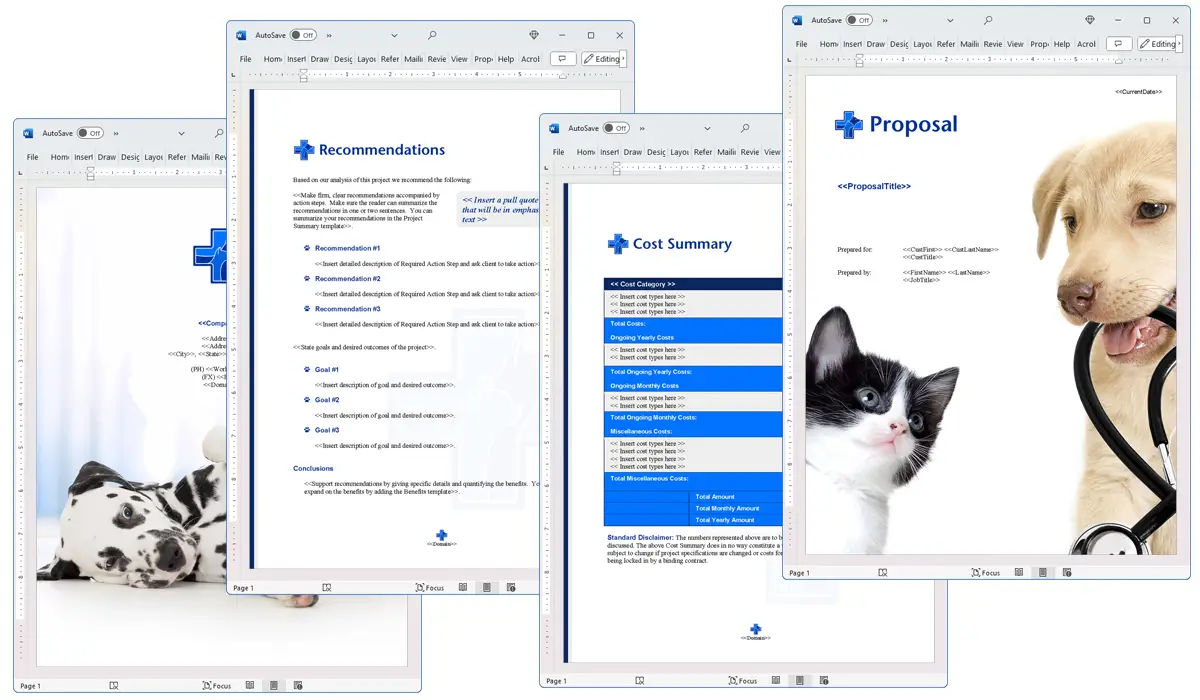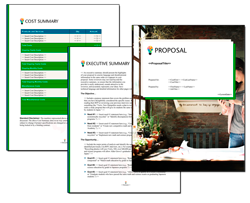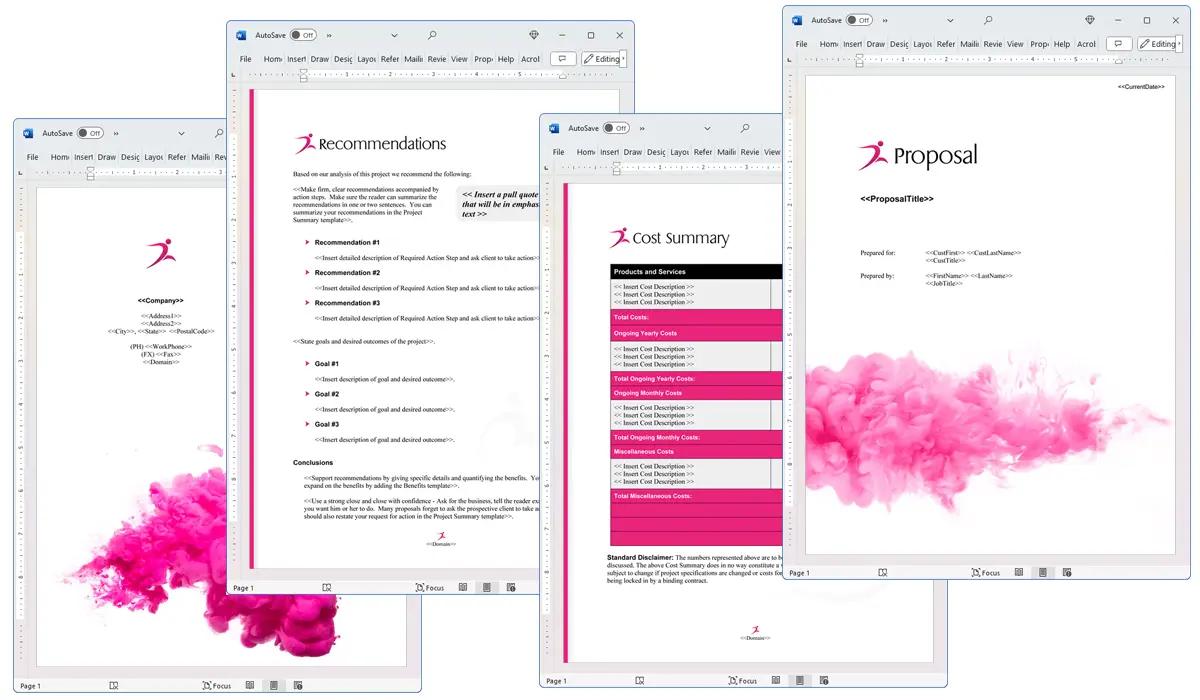What is the Failures chapter used for?
Proposal Kit Professional Bundle adds more design themes, all six Contract Packs,
a project management library, and Expert Edition software.

Illustration of Proposal Pack Animals #5
We include this Failures chapter template in every Proposal Pack, along with thousands more. You assemble this chapter with others in various combinations to create custom-tailored business proposals, plans, reports, and other documents. Proposal Packs apply custom visual designs to the templates, giving the final documents a consistent professional finish.
 DOWNLOADABLE, ONE-TIME COST, NO SUBSCRIPTION FEES
DOWNLOADABLE, ONE-TIME COST, NO SUBSCRIPTION FEES
Overview of the Failures Chapter
In the field of business proposals, every chapter serves a unique purpose and addresses specific aspects of the proposal's scope and intent. The Failures chapter is especially significant as it helps provide context about what has not worked in the past. This chapter is adept at setting the stage for presenting a new approach or solution by learning from previous mistakes. Understanding what didn't succeed previously offers valuable lessons and can be a powerful tool to enhance the credibility of the new proposal you are offering.
How is the Failures Chapter Used?
The Failures chapter is used in a business proposal to highlight past strategies, projects, or initiatives that did not meet their objectives. This retrospective view is not about assigning blame but about understanding and learning from these experiences. By including a Failures chapter, businesses can demonstrate analytical thinking, responsibility, and a proactive stance towards continuous improvement. This chapter often serves to differentiate a new proposition from older, unsuccessful attempts, making a strong case for why the new proposal might succeed where others did not.
What is Included in the Failures Chapter?
Typically, the Failures chapter includes:
- A detailed description of past initiatives related to the proposal's goals that did not succeed.
- Analysis of why these efforts failed, which may include incorrect assumptions, lack of resources, unforeseen external factors, or other relevant reasons.
- Lessons learned from these failures.
- How these lessons have been or will be applied to ensure the success of the current proposal.
The content is usually presented in a clear, factual manner, avoiding any emotional language or personal bias.
Use Case Examples for the Failures Chapter
- In a technology upgrade proposal: Detailing previous unsuccessful software implementations to emphasize the need for a more thorough needs assessment and stakeholder engagement.
- In a marketing strategy proposal: Describing past marketing campaigns that failed to increase engagement, highlighting the lack of market research and how the new proposal addresses this gap.
- In a project management proposal: Examining past project delays to stress on improved scheduling and resource allocation in the new approach.
- In an environmental policy proposal: Discussing earlier unsuccessful green initiatives to underline the importance of more robust sustainability practices.
- In a funding request: Showcasing previous investment shortcomings to argue the necessity of a revised funding strategy with enhanced oversight mechanisms.
Key Takeaways
- The Failures chapter is crucial for learning from past mistakes and setting the stage for a new, improved approach.
- It helps in demonstrating analytical depth and commitment to continuous improvement.
- This chapter includes descriptions of past failures, analysis of reasons, lessons learned, and how these lessons are applied in the new proposal.
- It is used to differentiate a new proposal from past unsuccessful attempts clearly.
- Through examining failures, the chapter reassures the proposal's stakeholders that prior errors have been acknowledged and addressed.

Illustration of Proposal Pack Social Media #2
 What Our Clients Say
What Our Clients SayI originally bought Proposal Pack Wizard to automatically assembly documents in my proposals. With 100s of sample proposals (technical and non-technical), the "Novice" or "Expert" features, and the ability to migrate old Wizard installations to the new version, it’s a no-brainer. Oh did I mention their stellar support and the fact that each Proposal Kit is licensed for [five] people? If you are thinking about purchasing Proposal Kit, I suggest you take a strong look at Proposal Pack Wizard also."
msDynamicsPlus LLC.
 4.7 stars, based on 842 reviews
4.7 stars, based on 842 reviewsRelated Chapters

The Failures chapter and other chapters are integrated into a Word document as illustrated here in the Proposal Pack Symbols #7 design theme. There are hundreds of design themes available, and every design theme includes the Failures chapter template.
A proper business proposal will include multiple chapters. This chapter is just one of many you can build into your proposal. We include the complete fill-in-the-blank template in our Proposal Pack template collections. We also include a library of sample proposals illustrating how companies in different industries, both large and small, have written proposals using our Proposal Packs. This template will show you how to write the Failures.
We include a chapter library for you to build from based on your needs. All proposals are different and have different needs and goals. Pick the chapters from our collection and organize them as needed for your proposal.
Using the Proposal Pack template library, you can create any business proposal, report, study, plan, or document.
 Ian Lauder has been helping businesses write their proposals and contracts for two decades. Ian is the owner and founder of Proposal Kit, one of the original sources of business proposal and contract software products started in 1997.
Ian Lauder has been helping businesses write their proposals and contracts for two decades. Ian is the owner and founder of Proposal Kit, one of the original sources of business proposal and contract software products started in 1997.By Ian Lauder
 Published by Proposal Kit, Inc.
Published by Proposal Kit, Inc.


 Cart
Cart
 Facebook
Facebook YouTube
YouTube X
X Search Site
Search Site